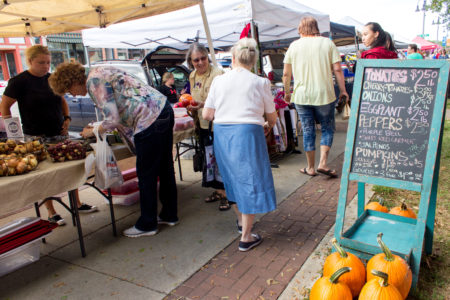
By Zane Silk
silkniha@grinnell.edu
The Grinnell Farmers Market has just introduced a new program that contradicts the common image of markets as the domain of hipsters and yuppies; it has started accepting payment for all vendors through the Supplemental Nutrition Assistance Program (SNAP), formerly and still commonly referred to as food stamps. This decision, spearheaded by the Grinnell Chamber of Commerce, which has been organizing the roughly forty year old market for the past twelve years, is intended to help low-income residents in the area access fresh produce and other food items from local farmers and vendors. Before the implementation of the new program on Aug. 25, only two vendors at the market accepted SNAP individually through a State of Iowa program.
“We started researching this program about three years ago, when one of our vendors brought it to us and said, ‘hey, can we do this market-wide?’” said Rachael Kinnick, the Chamber Director and the person in charge of managing the market.
It turned out that it was not possible to certify the entire market through the state, and so the initiative stalled.
“It really wasn’t until … Dubuque farmers market … started working directly with the [United States Department of Agriculture] at the federal level to implement this program, and it was then that we learned that this was a possibility,” Kinnick said.
Dubuque implemented a market-wide SNAP payment system in May 2015, and by the fall, Kinnick was seriously looking into the application process. She worked through the winter of this year to complete the lengthy application, and once it was submitted in March, the application took two months to be approved.
“Then we actually applied for another program through the Farmers Market Coalition, which helped us get the cost of some of the items that we had to purchase rebated back to us, and that process took another 60 days, and that’s kind of where our timeline got further and further into the summer, but we decided to go ahead and launch this year, even though we were more than halfway into the farmers market season,” Kinnick said.
The program also has the added benefit of allowing the market to accept credit and debit cards, for which a $1 fee per transaction will be charged.
“We incur a cost for every transaction that we do, and for the SNAP transactions we’re not able to pass that on to the customer,” Kinnick said. Luckily, “Grinnell College jumped onboard as a program sponsor of this endeavor and really helped us get it up and running in the sense of a financial commitment to make sure that we’re able to do it not just this year, but really sustain it long term.”
Kinnick is hopeful about the program and has reason to be. Data from the Dubuque market shows that implementing the same program led to a substantial increase in sales. Nonetheless, she acknowledges that it will be difficult at first to attract SNAP recipients to the market.
“That’s part of our challenge – to find the people who are SNAP recipients and make sure that they’re aware that they now can come to market,” Kinnick said.
“Mid-Iowa Community Action, which is one the larger service groups, they actually come and glean product at the end of every Thursday market, so they’re fully aware of it and they’re highly encouraging their clients to come out, it’s just a matter of time,” said Ann Brau, a vendor with the Compass Plant CSA farm and the volunteer manager of the market on Thursdays.
The Grinnell Farmers Market, which takes place on Thursdays and Saturdays, borrowed a payment system used by other markets that accept SNAP benefits, whereby customers buy tokens at a central booth with their SNAP Electronic Benefit Transfer cards or credit or debit cards, and use those tokens to buy food from the vendors. Vendors then have to return the tokens, for which they are reimbursed. The vendors went through training to accustom them to the token system, and most were happy to be part of making the market more accessible.
“A couple of them are a little reluctant just because it’s new and it’s different and there’s always some of that,“ Kinnick said.
One week and two markets into the program, Kinnick and Brau are unable to confirm that SNAP recipients have used the token system to purchase food at the market, but they remain cautiously optimistic that interest will pick up.
“We knew that it would take a while for folks to know that it was an option. We’ve had a lot of people ask when were rolling it out, so we hope that they’ll all come back here in the next couple weeks,” Kinnick said.



























































